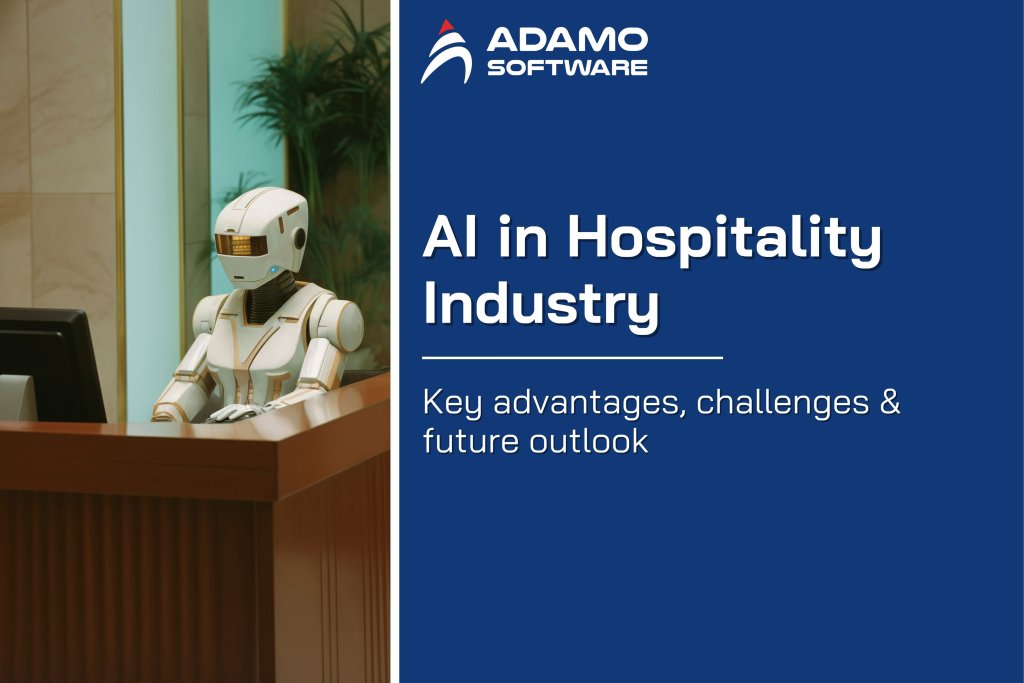Hotel Guest App: Complete Guide to The Best Hotel Apps
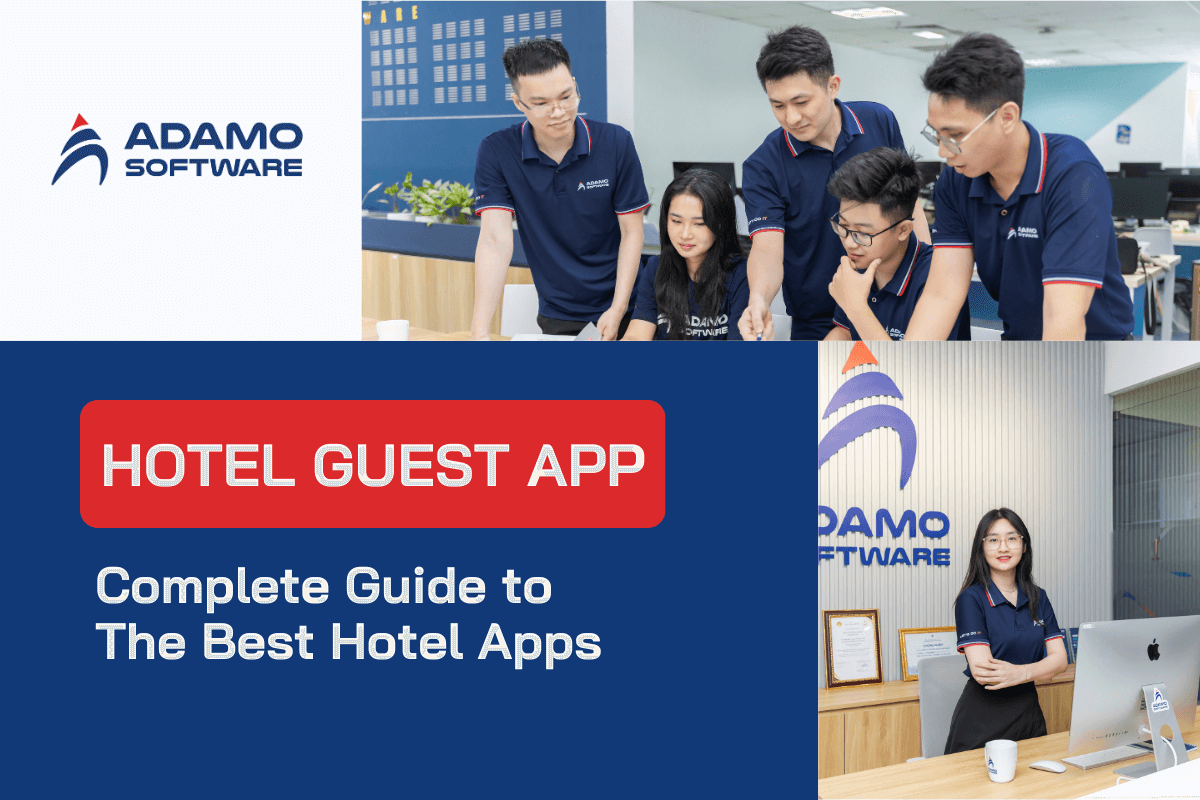
In the contemporary environment of hospitality, hotel guest communication applications are critical enablers of guests’ experiences and operations. These are applications that enable guests to control their experience through their smart devices right from the booking process, checking in, ordering food, and even checking out.
Here is a breakdown of the features and benefits of hotel guest apps, including mobile check-in, digital keys, and payment solutions. It also discusses the current trend in hospitality technology, offering information on how these apps are reshaping the industry. Even when you are a tourist looking for a better stay at a hotel, or a hotelier looking to remain relevant, this guide will guide you on what makes a hotel guest app stand out.
I. What is Hotel Guest App?
The Hotel Guest App is a mobile application, designed to elevate the customer experience by offering an enhanced level of customer service. It gives customers access to the hotel’s service and serves as a marketing channel, where the customer’s insight is met with targeted marketing strategies. Among many types of channel management softwares, hotel guest app will be the best assistance for hoteliers in boosting their businesses.
II. Why Hoteliers Need a Hotel Guest App?
There are several clear reasons why hoteliers require a hotel guest app and each offers clear benefits to improve efficiency and enhance the guest experience.
1. Communicate with Guests
A hotel guest application enables the straightforward sharing of information between the hotel and the guests. This way a guest can get important updates, be notified about any changes, or be informed about bookings or events. By being able to directly communicate with the guests you can keep them posted, and if they have any questions or issues they can easily contact the staff improving their stay.
2. Improved Guest Experience
An app is very important as it offers guests a convenient way to access services offered by the hotel. Guests can easily order meals through room service or make appointments for spas or restaurants with a tap of a button. Further, apps also have the opportunity for customization according to the guest’s willingness and prior experience with the hotel.
3. Enhanced Operational Efficiency
In hotel operations, the guest app is quite useful in that it can eliminate many steps. Online check-in and check-out processes help reduce congestion at the reception and the time it takes to process a guest’s request. Disparate work orders such as requests for housekeeping, maintenance, and other service issues, can also be addressed more effectively since the staff can get and tend to such work orders in a real-time manner. This leads to efficient service delivery and increased guest satisfaction, as mentioned above.
4. Exclusive Offers to Guests
Guests could receive app-only offers and discounts that the hotel can send to their mobile devices. These promotional messages can cater to anything from discount offers on spa treatments or meals to invitations to special events, all of which the guest takes advantage of. This not only improves their comfort but also contributes to the hotel’s income.
5. Save Time and Costs
Adopting a hotel guest app is one of the strategies that can result in a lot of time and cost savings. Self-check-in/check-out kiosks and request services for amenities significantly minimize the demand for front desk personnel, thereby lowering expenses. In addition, digital communication saves on the use of other materials such as paper, and this is economical as well as friendly to the environment.
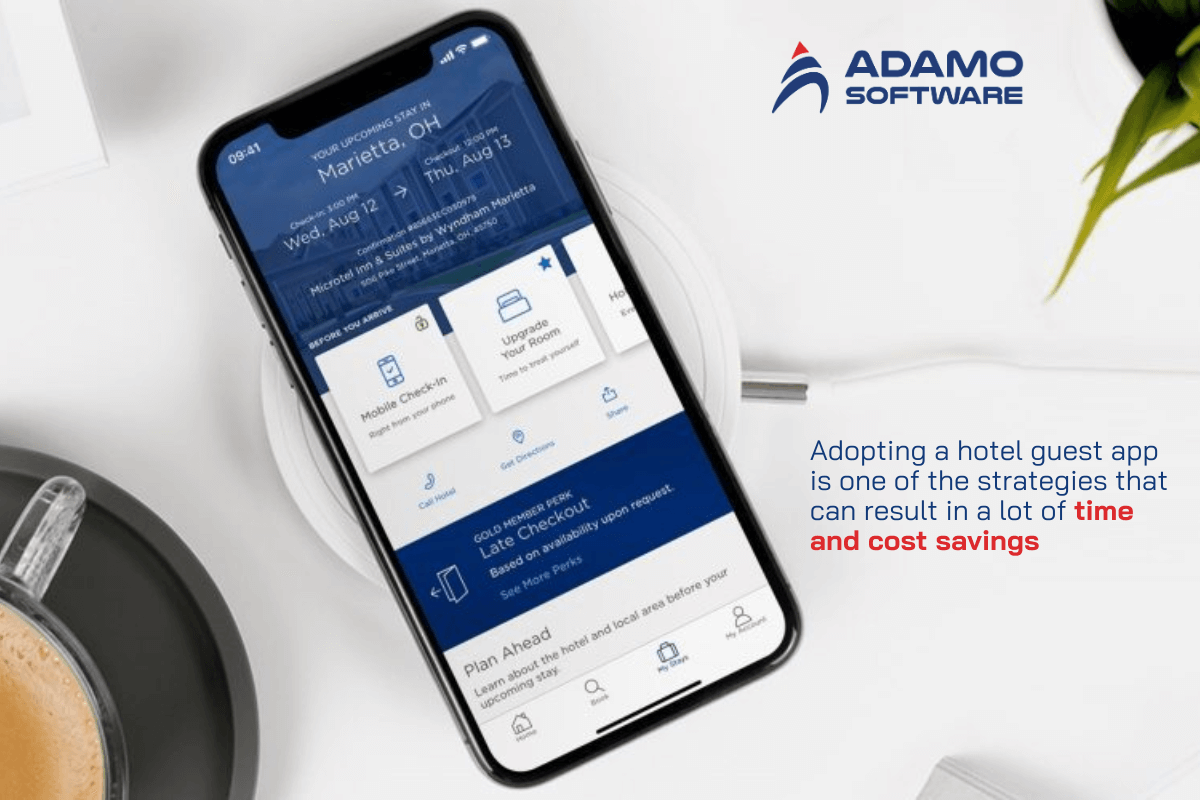
6. Communication with Hotel Staff
The app is a direct line of communication between the guest and the hotel staff. To avoid the need to call or visit the front desk, guests can make requests, report a problem, or ask a question. Such ease of communication enables problems to be solved efficiently and thus enhances the overall quality of service and satisfaction of guests.
7. Enhanced Communication
Apart from direct communication, the app amplifies communication by connecting several means. For instance, it can compile messages from various hotel departments so that communication with guests is documented and monitored. This integrated approach to communication guarantees that no guest’s needs or concerns are left unaddressed.
8. Essential Marketing Tools
A hotel guest app is also a marketing solution. It can obtain information about guests’ preferences and activities that could be used in targeted direct marketing. Guests can be notified of new services, events, or the next promotion and other related information, thus fostering loyalty. Further, integrated social media features can encourage guests to share their good experiences with other people on other social media platforms, thereby improving the hotel’s reputation.
III. Must-have Features of Hotel Guest Apps
For today’s travelers and hotels, a guest app can be a game changer. Here is a look at must-have features of this app:
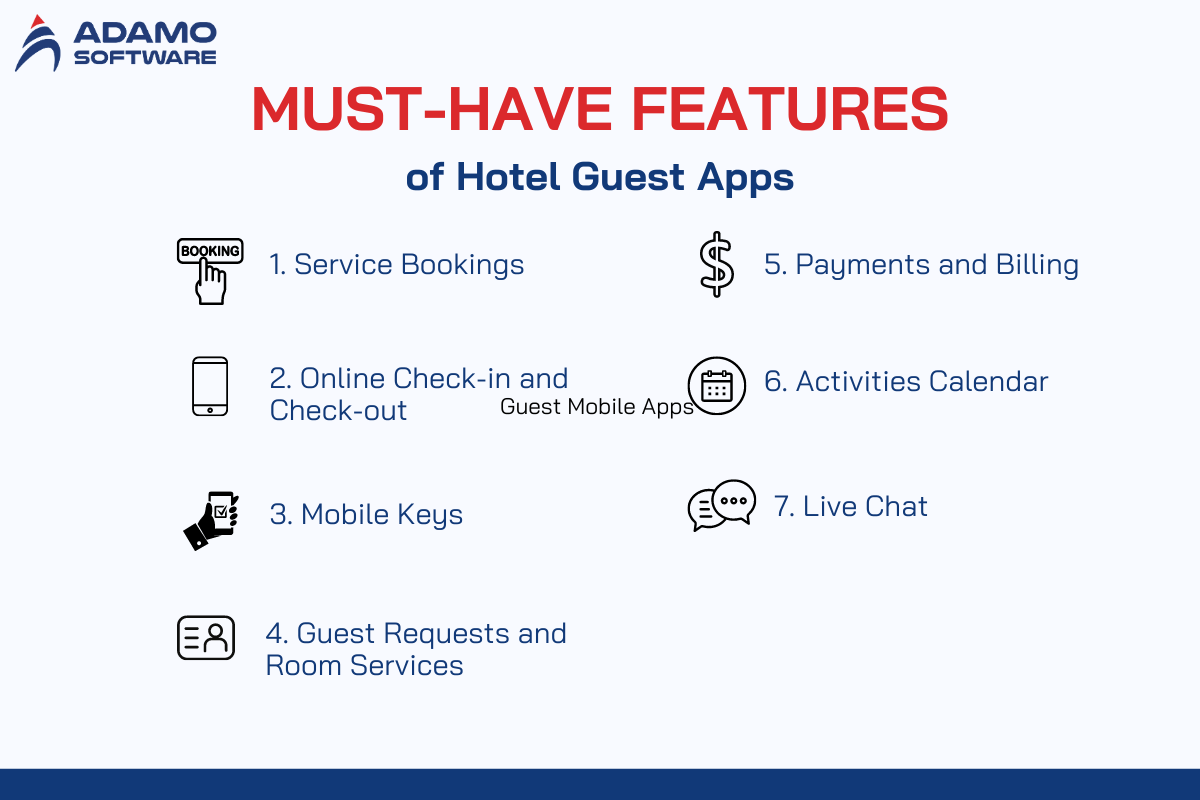
1. Service Bookings
Just think about ordering a spa treatment, a table at a restaurant, or an excursion just by using your phone. A good hotel guest app enables the guests to order these services without making a call or going to the concierge, thus making their stay even more enjoyable while making sure they fully utilize the services offered in the hotel.
2. Online Check-in and Check-out
People generally do not love queuing, especially after a long voyage. An app that provides online check-in and check-out means guests can manage these processes independently as they deem fit. They can check in before getting to the hotel, receive their room information immediately, and check out seamlessly, all through their hand-held devices. It is for the guests’ benefit as well, as it frees up the lobby and saves time for them.
3. Mobile Keys
A lost room key is an inconvenience, but with the use of mobile key solutions, guests can simply use their mobile devices to gain entry to their rooms. This feature increases security and simplifies the process of entering the rooms, as there are no risks of losing the key cards.
4. Guest Requests and Room Service
An app should allow guests to order anything they want quickly, from more pillows to meals in the room. It allows the guests to order services directly from the hotel personnel, thus guaranteeing their needs will be met. Additional updates concerning these requests are also real-time, contributing to the convenience and reassuring guests.
5. Payments and Billing
It is necessary to manage payments and billing within the app itself. It also means that guests can check their charges, pay their bills, and make payments conveniently from one location. This feature makes the checkout process convenient, and guests like the added sense of clarity.
6. Activities Calendar
Offering information concerning the events taking place in the establishment, others around them, or promotions can be helpful to a guest. By providing the guests with a calendar of integrated activities that are tailored to their interests, it becomes easier for them to organize themselves and become active participants in the events of the hotel. It is effective in customer interaction and increases sales for other products and services that the hotel offers.
7. Live Chat
Of course, there are times when guests require help or have inquiries that fall outside of regular business hours. They also have a live chat button that allows them to converse with the hotel staff for immediate assistance. From features such as amenities, and directions, to any problem that they face, live chat makes sure the guests feel a sense of immediate care.
IV. Future Trends for Guest Mobile Apps
Growth of technology is an ongoing process, and so are guest mobile applications in the hospitality industry.
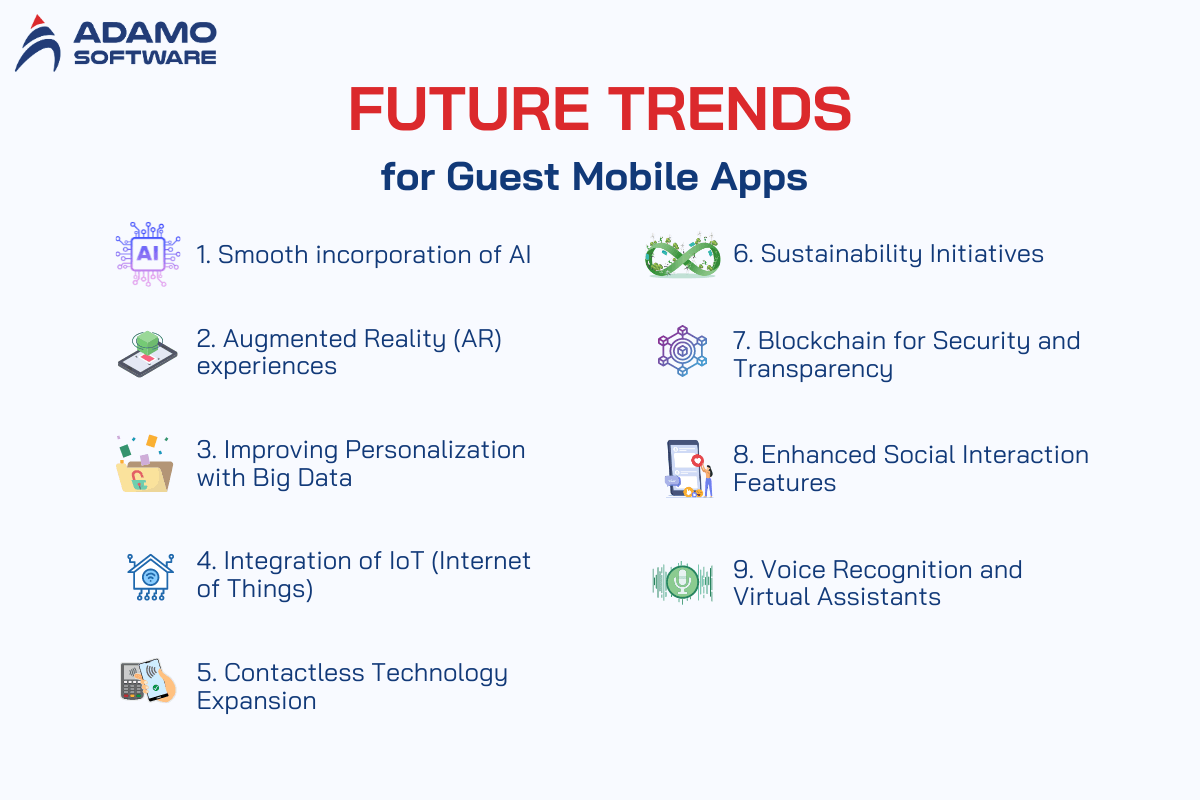
1. Smooth Incorporation of Artificial Intelligence (AI)
AI will be utilized to improve the guests’ experience at the hotel. The use of features such as recommending room service based on guests’ previous preferences and, the use of chatbots to assist guests, are a few of the areas that will enhance natural and efficient interaction.
2. Augmented Reality (AR) Experiences
Envision being able to navigate virtual room tours of hotels or attractions within the vicinity of the hotel via phone. AR may provide visual augmentations to guests enabling them to visualize units, services, and facilities in real time, thereby improving their decisions and enthusiasm regarding their vacations.
3. Improving the level of personalization with the help of big data
Read This: Hotels will use big data analysis for data about guests’ behaviors and preferences. These insights will inform targeted suggestions, offers, and guest experiences that can be predictive in fulfilling each guest’s requirements.
4. Integration of IoT (Internet of Things)
Smart devices will be integrated into guest rooms, where guests can manage temperature, lights, and room entertainment directly through the app. This level of control improves comfort and convenience in addition to displaying the latest in technology.
5. Contactless Technology Expansion
Based on recent global events, contactless technology will advance further. Contactless check-in and check-out, mobile payments, and digital key cards are all expected to become more common, as they offer safety and convenience.
6. Sustainability Initiatives
Guest apps will continue to play a major role in supporting sustainable initiatives. This can involve the provision of digital receipts instead of printed ones, suggestions of sustainable activities to do around the hotel, and facts about the hotel’s environmental practices in response to the guests’ increasing environmental awareness.
7. Blockchain for Security and Transparency
The use of blockchain technology can be seen as a means of improving security and increasing the level of openness in guest operations. It can be used to provide secure payments, solve the problem of fake reviews, and let clients trust hotels.
8. Enhanced Social Interaction Features
The social aspects of guest apps will be more prominent, giving guests a way to communicate with fellow travelers and enjoy hotel-provided events or local meetups. This creates a shared feeling of being part of a community and makes for a better guest experience.
9. Voice Recognition and Virtual Assistants
Guests will directly interact with the app via voice-activated commands and virtual assistants. This way, the guests can use voice commands to order services, get the necessary information, or adjust the room’s features without having to touch anything, which adds to the guests’ comfort.
V. Guide to Develop a Customized Hotel Guest App
Due to the market trends and demand of the guests and convenience of the operations, it is important to achieve a proper strategy for making and designing a customized hotel guest app.
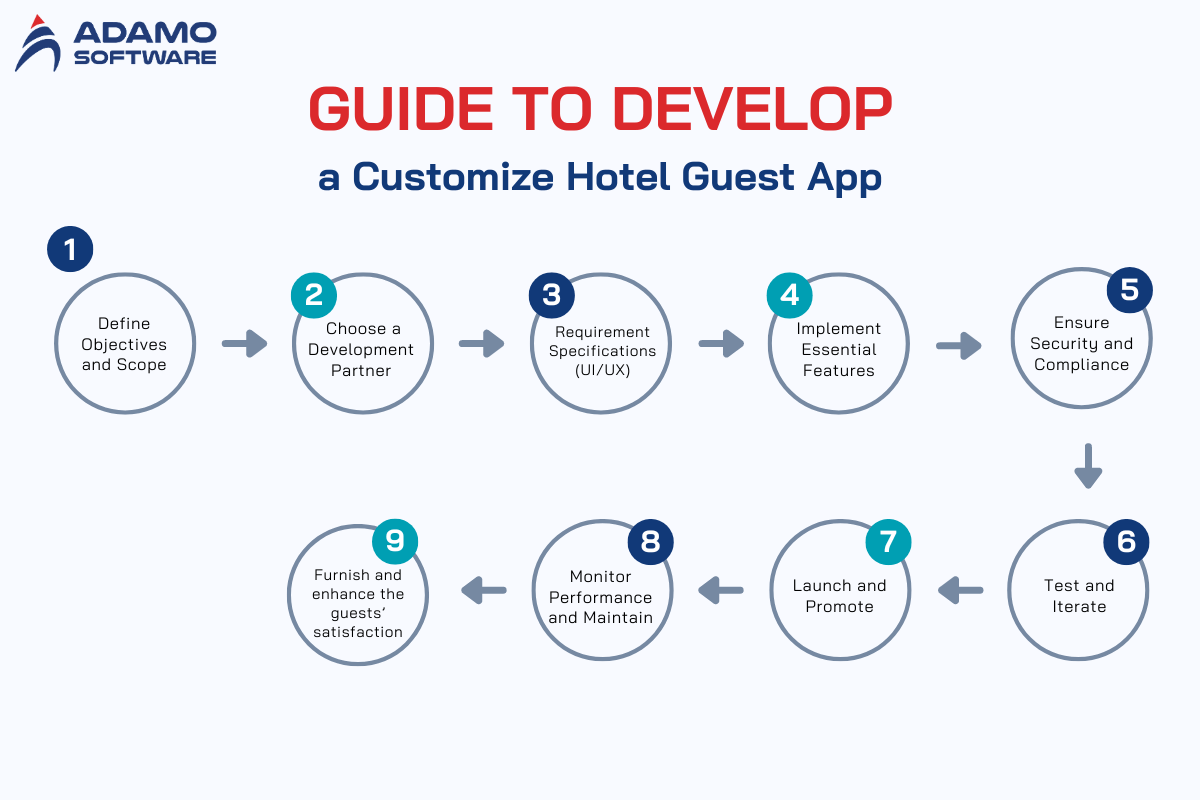
1. Define Objectives and Scope
– Understand Goals: Justify why the app is necessary – whether it is to improve guests’ satisfaction, operations, or both.
– Identify Features: They include services that help with bookings, mobile check-in/checkout notifications, services that enable room service, payments, and communication options.
– Unique Selling Points: Always emphasize what makes your app unique, namely, the function of recommending items, seamless compatibility with IoT devices, or the focus on environmental protection.
2. Choose a Development Partner
– Partner Selection: Adamo Service primarily deals in creating user-friendly, tailored hotel guest apps that would meet your needs and reflect your brand.
– Expertise and Experience: Employ Adamo Service’s specialized knowledge of the hospitality sector to integrate a competent and intuitive application.
– Collaborative Approach: Stay in touch with the designers at Adamo Service during the development concept to ensure you achieve what you want out of it.
3. Requirement Specifications (UI/UX)
– Intuitive Design: Develop a standard and entailing design of the interface that will be relevant to the particular hotel.
– Streamlined User Experience: Aim at convenience for instance, while ordering services to check out, to create strong impressions about guests.
– Accessibility: The app should be made readily useable for all the end users, and this should follow accessibility standards.
4. Implement Essential Features
– Service Bookings: Allow the guest to make bookings for spa treatments, and dining reservations, and organize excursions without any hindrances by displaying the time options and confirming the selected slot immediately.
– Mobile Check-in/out: Assure that check-in and check-out go smoothly, providing the guests with the room details and other preferences in a digital manner that will reach the guests’ devices.
– Guest Requests and Room Service: Organize flexible means of communication for the guest in a hotel to be able to make a request, order for room service, or report a distorted maintenance issue.
– Payments and Billing: The payment methods should also be secure; you should provide detailed invoices for a better understanding of expenses and allow receipts in digital format.
5. Ensure Security and Compliance
– Data Protection: Make sure that guest data and transactions are well protected from any breach of stringent policies and practices that are mandated by law.
– Privacy Compliance: This should be done by the various data privacy laws that have become rampant globally, such as the GDPR and the CCPA, to foster the confidence of such guests.
6. Test and Iterate
– Quality Assurance: Based on this, it is advised that various tests should be run on different devices as well as on different platforms to realize the different hitches on the interfaces and fix them.
– User Feedback: Beta testing, in particular, is done to get feedback from customers who use the application and the changes that are made to the performance of features that are in the application on the date of launch.
7. Launch and Promote
– Rollout Strategy: Make sure that an implementation plan is made progressively through the rollout of the strategies in phases , and arrange a trial run to gather feedback for the last changes.
– Marketing Campaign: Advertising opportunities must be explored to promote the application for use by guests while emphasizing onthe capabilities of the organization to encourage the use of the application.
– Training and Support: Time should therefore be taken to make sure all the people in the hotel; both the workers and the visitors are fully aware of the functions that the app holds for them and to also be given the necessary directives on how best to utilize the app.
8. Monitor Performance and Maintain
– Analytics: For this, the client should employ analytics solutions as a way of identifying the performance of the app, users’ engagement, and transactions that might take place on the app to enhance the app.
– Regular Updates: The additional or related items that a user will want or the advancement in technology should be placed under regular updates of new features, security features, and upgrades.
9. Furnish and enhance the guests’ well-being and satisfaction
– Customer Support: My suggestion to the guest is to give the guest a list of customer support options about the features in the app such as a live chat or ticketing system if the guests are to encounter any problems.
– Personalization: Integrate data analytics into the recommendations offered before they are made, general promotions and marketing, and guest-based messages such as room service reminders.
VI. F.A.Qs Related to Hotel Guest App
1. How much time does it take to configure or deploy the Guest App?
Creating a hotel guest app takes 3 to 6 months on average. This includes 1-2 weeks for the planning phase, 2-4 months for the development phase, and 1-2 weeks for the testing and deployment phases. It depends on the complexity of the project and the nature of the task to be fulfilled.
2. What is the difference between installation and usage of the app through a web browser?
Downloading the App: Users download and install applications from app markets such as Google Play Store or Apple App Store so that they can use them offline, and some of them can even use push notifications.
Using the App on the Web: It is an application that runs on a browser and does not require installation on any device with an internet connection. However, it may be less efficient in terms of performance as well as the integration of device features compared to native applications.
3. What tactics can be used to get people to download the app?
To boost app adoption:
– Email headers, Facebook and Twitter tiles, and website banners for promotional campaigns.
– Promote the app download by offering such items as discounts or the new upgraded version.
– Post the QR codes and posters within the compound for them to easily spread within the facility.
– Targeted notifications with key app features before and during a customer’s visit.
4. Is it possible to specify my requirements in terms of the app?
– Branding: This should be aligned with the hotel logo, color, and style to have consistency with that of the hotel brand.
– Features: Customize offerings, such as booking services, to customer expectations.
– Content: It is important to update local guides, events, and amenities to boost guests’ engagement properly.
– Integration: It should be integrated with the Property Management System (PMS), Customer Relationship Management (CRM), and loyalty programs, among others.
5. What measures are taken to ensure the security of personal data in the context of the guest app?
– Encryption of data especially when it is sensitive information like personal details or payments.
– Obeying data protection laws (i.e., GDPR, CCPA).
– The ability for users to decide what data can be shared as well as what notifications they receive.
– Real-time security assessments, and updates to minimize risks.
VII. Build a Robust Hotel Guest App with Adamo Software
A strong hotel guest app can go a long way in boosting guest satisfaction while at the same time improving the efficiency of business operations. Adamo Software focuses on delivering hotel guest applications for mobile devices with such basic functions as mobile registration, electronic keys, orders for services, and payment methods.

What sets Adamo Software apart is that you receive a solution that fits your brand and operations. The emphasis is placed on usability, security, and compatibility with your current infrastructure to provide a comprehensive and seamless experience for guests. Through the collaborative development process, your vision is incorporated into all aspects of the app.
Our commitment to support means that you will not only get help with the travel and hospitality software development but also after its creation until it does not lose its functionality and relevance.





